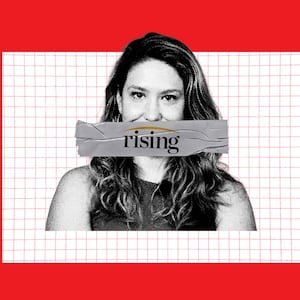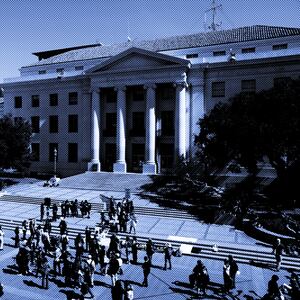It must be a day ending in “y”, because free speech is once again at issue on the University of California-Berkeley campus.
A recent campaign by Law Students for Justice in Palestine (LSJP), a student group supporting Palestinian liberation, asking other progressive student groups to pledge not to host speakers that support Israeli apartheid has provoked a wave of condemnation and disinformation.
Berkeley Law’s Dean Erwin Chemerinsky publicly condemned the campaign in a statement, strongly implying it ran afoul of free speech and anti-discrimination principles. Chancellor Carol Christ, too, condemned the campaign, suggesting that excluding speakers with particular views on Israel would endanger the safety and security of Jewish community members. Following these statements, a Democratic member of Congress and a long list of Israel lobby organizations and professors piled on. And to add to the absurdity, an article in Jewish Journal falsely alleged that the campus was creating “Jewish free zones” by permitting the adoption of the pledge.
But this is nonsense: student organizations can determine for themselves which speakers align with their politics; they cannot be compelled to invite any speaker. Campus groups organized around issue areas, from antiracism to reproductive rights, host speakers and events in order to advance a particular political perspective. Just as these groups are under no obligation to host white supremacists or people who oppose a woman’s right to an abortion, no student group is constitutionally obligated to host pro-Zionist speakers.
And the pledge has nothing to do with Judaism; it is about student groups with shared progressive values agreeing not to host speakers who don't share those values, namely, by supporting Israel's policies of land theft, ethnic cleansing, and apartheid. It does not discriminate on the basis of religion at all: Hosting a non-Jewish Zionist (for example, a Christian or Hindu) would violate the pledge, whereas hosting a Jewish anti-Zionist would not. Tellingly, no one in the status quo seems to have a problem with the fact that Hillel, an organization that purports to be a center for all Jewish life, maintains standards of partnership that prohibit it from hosting anti-Zionist speakers.
This egregious double standard demonstrates that what is at stake is not just freedom of expression. It is the content of what is being expressed, namely a political commitment to Palestinian liberation and a steadfast opposition to apartheid, that has provoked this backlash.
This double standard is nothing new. At Palestine Legal, we regularly encounter the suppression of pro-Palestine expression from university administrations, often at the urging of Israel advocacy organizations and even the Israeli government itself.
And the playbook is consistent: 1) reframe the issue to exclusively center Jewish students, erasing both Palestinian perspectives on campus and the impact that U.S. support for Israeli apartheid has for Palestinians living under occupation; 2) falsely conflate opposition to Israeli apartheid with antisemitism; and 3) take punitive measure against students organizing for justice. We’ve responded to over a thousand of such cases, and the repression keeps coming.
The students’ campaign comes at a time of increased scrutiny on Israel. Recent reports from some of the world’s most respected human rights organizations have confirmed what Palestinians like myself have been saying for decades: Israel is an apartheid regime.
Following a report from B’tselem, the leading Israeli human rights organization, that concluded as much in early 2021, both Human Rights Watch and Amnesty International issued comprehensive reports on Israeli apartheid.
This should come as no surprise for anyone paying attention to news from the region. Since the beginning of 2021, Israel has conducted another horrific bombing campaign on the Gaza Strip, which it has kept under blockade since 2007, in which they targeted residential buildings and killed scores of Palestinian civilians; continued settlement expansion in the West Bank; assassinated the iconic Palestinian-American journalist Shireen Abu Aqleh; imprisoned hundreds of Palestinians, many of whom are children, without charges or trial in its controversial practice of administrative detention; all while maintaining its illegal and deadly occupation of Palestinian land.
It is against this backdrop that LSJP has encouraged fellow student groups to pledge not to host speakers who support apartheid. By condemning this activism, university administrators are stating loud and clear that opposition to Israeli apartheid is not welcome on campus.
For myself, as an alumnus of the law school and social justice advocate who is both Palestinian and a Jewish American, I am proud that these students are taking a bold stand against injustice and building solidarity across axes of oppression along the way. I just received my alumni magazine with a cover page promoting "how [Berkeley Law is] fighting for our rights and working to advance justice, freedom, and equality at home and around the world."
Does that extend to Palestinians—or is there an exception for us?








